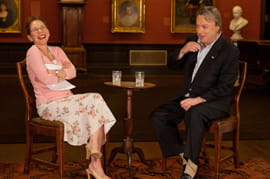Remembering Christopher Hitchens

Christopher Hitchens (1949-2011), author, journalist and guest on The Drexel InterView, died on December 15, 2011 at the age of 62. He was our foremost public intellectual.
Born in Britain, he became an American citizen four years ago and would say that he found America more compatible with his values and his character. I interviewed Christopher Hitchens only a few days before it became known that he was suffering from stage 4 esophageal cancer. Looking at that interview, I wonder if he knew the diagnosis then. He seemed a bit weary and a bit sad, and he cleared his throat more often than seemed normal. But he voiced his opinions with the same verve and clarity that he had always done.
He spoke about his latest memoir, Hitch-22, and discussed his parents (most wrenchingly, his mother’s suicide). He explained how his commitment to Marxism, which had fueled so much of his early political activity, had both changed and remained the same. Finally, he talked about his views on religion and, specifically, his most famous book, God is Not Great: How Religion Poisons Everything. He said he looked to literature, not scripture, for meaning, and he counted most of all on friendship as his solace in the face of life’s trials.
In subsequent interviews following his diagnosis, Hitchens remained steadfast in his religious skepticism. Asked if he thought that his illness might lead him to express a belief in God, he said that he could not imagine this; if it were to happen, he disavowed responsibility in advance. “The entity making such a remark might be a raving, terrified person whose cancer has spread to the brain. I can’t guarantee that such an entity wouldn’t make such a ridiculous remark, but no one recognizable as myself would ever make such a remark.” As far as I know, he remained himself to the end.
Hitchens did not toe an ideological line. He liked the good things in life—food, drink, and until his diagnosis, cigarettes—but he had compassion for those who suffered oppression and was fearless about voicing unpopular opinions. Time spent in Iraq with the people of that country convinced him that intervention there was necessary, and he alienated many liberal friends by supporting that war. Left and right-leaning individuals embraced him—and excoriated him. He was both trenchant and whimsical, a brilliant stylist and a fierce advocate. He was difficult to pigeon-hole and, for that reason, always worth reading and listening to.
Click here to view interviews with Christopher Hitchens on Drexel's YouTube channel.
Drexel News is produced by
University Marketing and Communications.